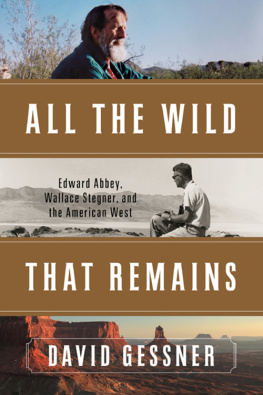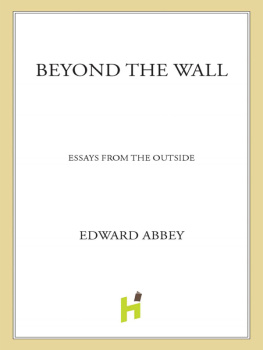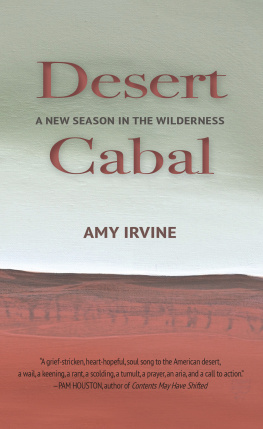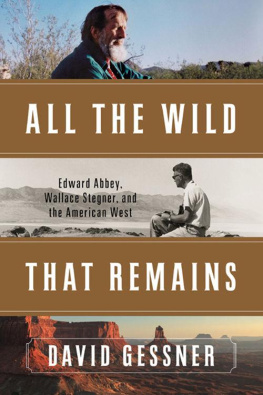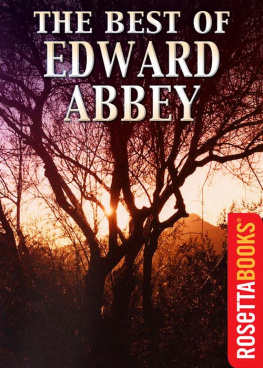Abbey in America

Abbey in America
A Philosophers Legacy in a New Century
EDITED BY JOHN A. MURRAY

2015 by the University of New Mexico Press
All rights reserved. Published 2015
Printed in the United States of America
201918171615123456
The Library of Congress has cataloged the printed edition as follows:
Abbey in America : a philosophers legacy in a new century / edited by John A. Murray.
pages cm
Includes bibliographical references and index.
ISBN 978-0-8263-5517-1 (cloth : alk. paper) ISBN 978-0-8263-5518-8 (electronic)
1. Abbey, Edward, 19271989Criticism and interpretation. I. Murray, John A., 1954 editor.
PS3551.B2Z55 2015
813'.54DC23
2014033717
Abbeys Road, by Edward Hoagland, first appeared in the New York Times (1990) and was later included in Hoagland on Nature: Essays (New York: Lyons Press, 2003). On the Edge with Edward Abbey, Charles Ives, and the Outlaws, by Charles Bowden, was published in excerpted form in High Country News (October 13, 2014). John A. Murrays book review of Abbeys last book The Fools Progress, included in the appendix, was published in the Bloomsbury Review (March/April 1989). Material from Doug Peackocks Desert Solitaire Revisited previously appeared as the preface to the French edition of Edward Abbeys Desert Solitaire published by Gallmeister in 2010.
All photographs by John A. Murray were taken on traditional film and developed in a darkroom, in large format (4 5), medium format (6 4.5), and 35 mm. All photographs were provided by John A. Murray, except for the Wendell Berry photograph at the 1989 Abbey memorial, taken by Charles W. Murray Jr.; the photograph of John A. Murray with the state record mule deer, taken by Charles W. Murray Jr.; the self-portrait by Genoa Alexander; and the photograph of Esther Rose Honig in the Atacama desert, which was taken by Ali Zadmehr.
Cover image: A detail of a 6 6-inch engraving of Edward Abbey entitled The River Rat by John A. Murray 2014.
Designed by Lisa Tremaine
This book is dedicated to the memory of
Dr. Maria Santos Gorrostieta Salazar (19762012)
of Tiquicheo, Michoacn, Mexico, and all those
courageous activists, journalists, and authors
around the world who have been silenced in recent years
for speaking the truth to power, as Edward Abbey,
a great humanist, consistently did
throughout his life and literary career.
Contents
KATHLEEN DEAN MOORE
MICHAEL BRANCH
JOHN ALCOCK
CURT MEINE
BEN A. MINTEER
NANCY LORD
GLENN VANSTRUM
EDWARD HOAGLAND
DOUG PEACOCK
JACK LOEFFLER
CHARLES BOWDEN
JOHN A. MURRAY
GENOA ALEXANDER
ESTHER ROSE HONIG
A Review by John A. Murray
Preface
As I gathered the contributors for this book, I recalled the early scenes of The Magnificent Seven, as Yul Brynner searched Tombstone for a band of gunslingers to make one last trip into the back of the beyond. It was an enjoyable process, as I made contact with old friends, as well as established communications with authors and scholars I had not met before, but whose works I had long admired. I would like to thank each of them for joining me on this saddle-creaking, extended journey of exploration and understanding. I must express my gratitude to Ted Hoagland, who urged me in a February 2014 phone conversation to make an extra effort in my search for the reclusive Charles Bowden, who I finally was able to track down through one of his publishers (much thanks to Kristen Buckles, an editor at the University of Arizona Press, for her kind assistance!). It was with great sadness that I learned of the death of Charles Bowden at his home in Las Cruces, New Mexico, on August 30, 2014, shortly after I received a final email from him that spoke of his enthusiasm for the book. I would also like to thank Gavin Van Horn, the director of Culture Studies at the Center for Humans and Nature in Chicago, for his thoughtful and detailed critique of the work, which greatly improved the book. Many additional writers, scholars, and public figures were invited to join the book with a reflective essay that gave fresh consideration to Abbey but had to reluctantly decline because of other obligations. They are here in spirit and include Gary Snyder, Craig Childs, Cheryl Strayed, Gary Nabhan, David Quammen, Tom McGuane, Linda Hogan, Robert Redford, John Macrae (Abbeys editor at Holt), Bill McKibben (Middlebury), Scott Russell Sanders (emeritus, Indiana University), Paul Hutton (University of New Mexico), Durwood Ball (University of New Mexico), and Patricia Limerick (University of Colorado).
Hopefully this book will help in part, if only symbolically, to return Abbey to the institution of higher learning at which he began his intellectual pilgrimage.
Abbey in America examines the case for accepting the authors works into the English and American prose canon. While pursuing a thesis regarding the merits of Abbeys writings first advanced by Thomas J. Lyon of Utah State University in 1987, the work also addresses arguments to the contrary. The authors legendary drinking, and its destructive effect on his life and later writings, is frankly addressed, as are his often-contentious literary and personal relationships with other members of the guild. The uneven nature of Abbeys published fiction is acknowledged in the introduction and afterword. Abbey was a complex and polarizing figure, with a mixture of assets and liabilities. He has proven to be endlessly fascinating, both as a prolific author and as an outspoken advocate for his beliefs. In that spirit, both informed praise and judicious criticism, by the editor and the thirteen contributors, can be found in these pages.
This new examination of the authors legacy may be seen by future scholars as the first step, in the new century, toward a comprehensive evaluation of the late twentieth-century figure, much as, a century ago, our predecessors began the process of reappraising Thoreau. Thoreau was increasingly classified not as a poet and lecturer, as he perceived himself and was thought of by his contemporaries, including Emerson and Hawthorne, but as a unique and gifted essayist and as the author of an essential philosophical work. Similarly, Abbey can now be regarded not as a major fiction writer or even as a major minor fiction writer, as he preferred to view himself, but, rather, as an essayist of the first rank. The consensus appears to be that two of Abbeys worksDesert Solitaire: A Season in the Wilderness and Abbeys Roadare as accomplished as anything in the English and American prose canon, and that is no small achievement for this distinguished UNM graduate.
Note
. Edward Abbey, Confessions of a Barbarian: Selections from the Journals of Edward Abbey, 19511989, ed. David Petersen (New York: Little, Brown and Co., 1994), 81.
Introduction
Edward Abbey, Yesterday and Today
A civilization, nearing its end, may burst into all the transient and melancholy glory of a cottonwood in autumn.
EDWARD ABBEY, JOURNALS (ALBUQUERQUE, DECEMBER 27, 1954)
Twenty-six years after his passing, Edward Abbey (19271989) remains a central figure in the literature of nature. From a humble stone hut on the side of a desert wash, Abbey became one of the most influential champions of the environment in his era. He set out to produce a collection of essays documenting his service as a seasonal ranger at a national monument in Utah, during a period of isolation and despair as a novelist. By the time he was done, he had created a work to place on the shelf beside those by Henry David Thoreau, Rachel Carson, and Joseph Wood Krutch. One recalls Jonathan Swift, who, disillusioned with the age of Restoration, sat down to write
Next page

